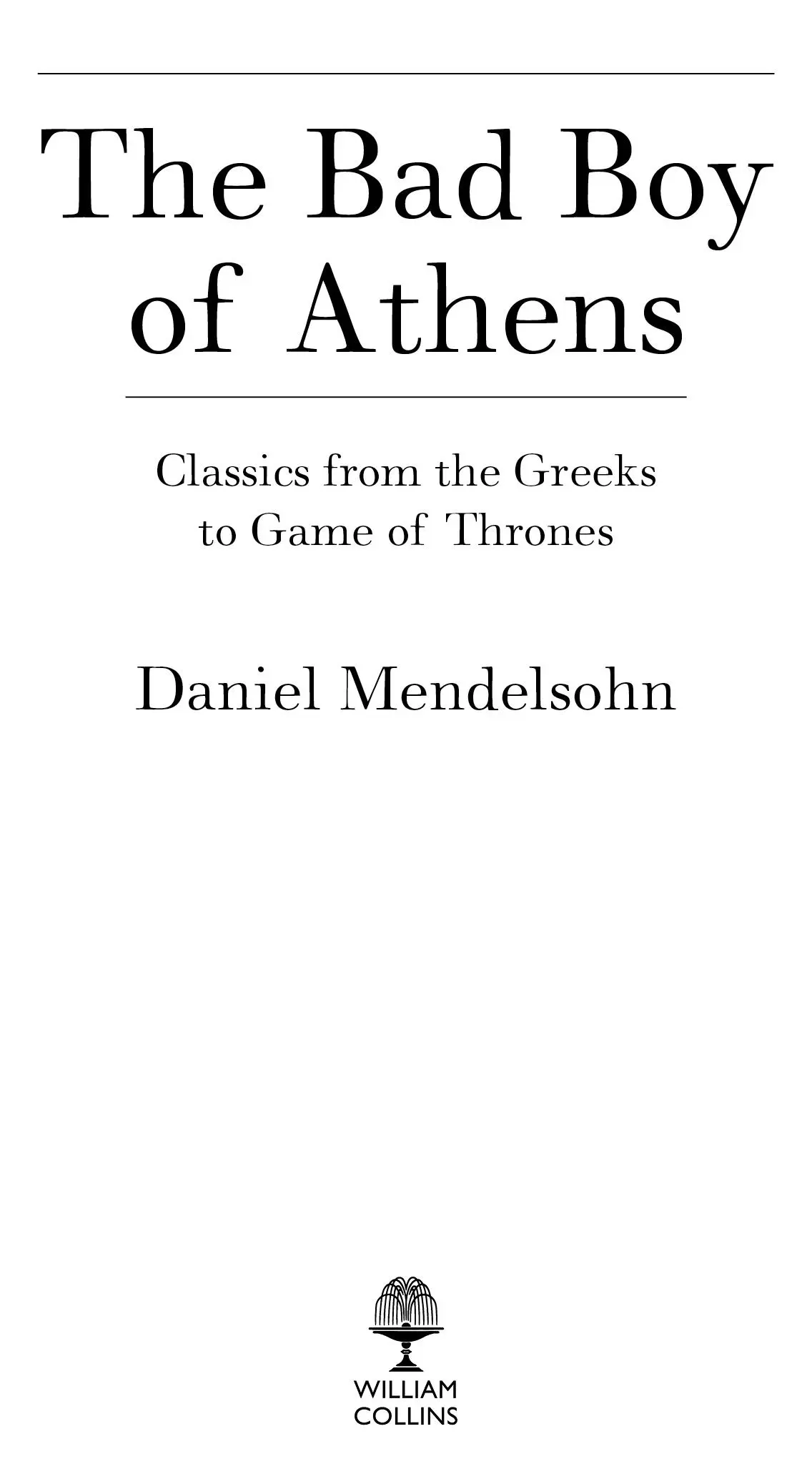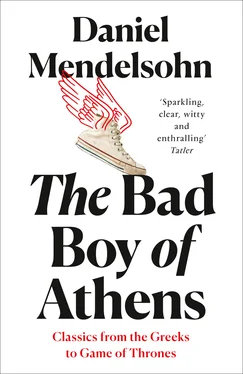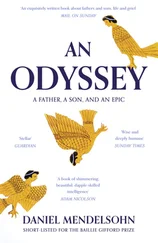
William Collins
An imprint of HarperCollins Publishers
1 London Bridge Street
London SE1 9GF
www.WilliamCollinsBooks.com
This eBook first published in Great Britain by William Collins in 2019
Copyright © Daniel Mendelsohn 2019
Cover image © Shutterstock, wings by Jo Walker
Daniel Mendelsohn asserts the moral right to be identified as the author of this work
A catalogue record for this book is available from the British Library
All rights reserved under International and Pan-American Copyright Conventions. By payment of the required fees, you have been granted the non-exclusive, non-transferable right to access and read the text of this e-book on screen. No part of this text may be reproduced, transmitted, down-loaded, decompiled, reverse engineered, or stored in or introduced into any information storage and retrieval system, in any form or by any means, whether electronic or mechanical, now known or hereinafter invented, without the express written permission of HarperCollins.
Source ISBN: 9780008245122
Ebook Edition © July 2019 ISBN: 9780007545162
Version: 2020-02-12
For
M. M. McCabe,
Patrick McGrath,
and all my other McGrath cousins
1 Cover
2 Title Page
3 Copyright
4 Dedication
5 Contents
6 Preface
7 The Robots Are Winning!
8 Girl, Interrupted
9 Not an Ideal Husband
10 The Bad Boy of Athens
11 Alexander, the Movie!
12 The Strange Music of Horace
13 Epic Fail?
14 The Women and the Thrones
15 Unsinkable
16 Not Afraid of Virginia Woolf
17 White or Grey?
18 The Two Oscar Wildes
19 The Tale of Two Housmans
20 Bitter-Sweet
21 The Collector
22 The End of the Road
23 I, Knausgaard
24 A Lot of Pain
25 The American Boy
26 Acknowledgements
27 Also by Daniel Mendelsohn
28 About the Author
29 About the Publisher
Landmarks CoverFrontmatterStart of ContentBackmatter
List of Pages iii iv v 1 2 3 4 5 6 7 8 9 10 11 12 13 14 15 16 17 18 19 20 21 22 23 24 25 26 27 28 29 30 31 32 33 34 35 36 37 38 39 40 41 42 43 44 45 46 47 48 49 50 51 52 53 54 55 56 57 58 59 60 61 62 63 64 65 66 67 68 69 70 71 72 73 74 75 76 77 78 79 80 81 82 83 84 85 86 8788899091929394959697 9899100101102103104105106107108109110111112113114115116117 118119120121122123124125126127128129130131132133134135136137138 139140141142143144145146147148149150151152153154 155156157158159160161162163164165166167168169170171172173174175 176177178179180181182183184185186187188189190191192193 194195196197198199200201202203204205206207208 209210211212213214215216217218219220221222223224225226 227228229230231232233234235236237238239240241242243244245246247248249250 251252253254255256257258259260261262263 264265266267268269270271272273274275276277278279280281282283284285286287288 289290291292293294295296297298299300301302303304 305306307308309310311312313314315316 317318319320321322323324325326327328329 330331332333334335336337338339340341342343344345346347348349350351352353354355356357358359360361362363364365366 367368 ii 369
In the autumn of 1990, when I was thirty years old and halfway through my doctoral thesis on Greek tragedy, I started submitting book and film reviews to various magazines and newspapers, had a few accepted, and within a year had decided to leave academia and try my hand at being a full-time writer.
On hearing of my plans, my father, a taciturn mathematician who, I knew, had abandoned his own PhD thesis many years earlier, urged me with uncommon heat to finish my degree. ‘Just in case the writing thing doesn’t work out!’ he grumbled. Mostly to placate him and my mother – I’d already stretched my parents’ patience, after all, to say nothing of their resources, by studying Greek as an undergraduate and then pursuing the graduate degree – I said yes. I finished the thesis (about the role of women in two obscure and rather lumpy plays by Euripides) in 1994, took my degree, and within a week of the graduation ceremony I’d moved to a one-room apartment in New York City and started freelancing full-time.
This bit of autobiography is meant to explain the contents and, to some extent, the title of the present collection of essays that I’ve published over the past two decades. When I was first settling into my new life, I was eager to leave my academic past behind and write about genres that I’d been passionate about since my teens (opera, film, theatre, music videos, and television) and subjects that exercised a particular fascination for me (not only the ancient past but family history; sexuality, too). This I began to do, as a perusal of the Table of Contents here will show. But fairly early on in my freelancing career, I found myself being asked by editors who knew I’d done a degree in Classics to review, say, a new translation of the Iliad , or a big-budget TV adaptation of the Odyssey , or a modern-dress production of Medea . I ended up finding real pleasure in these assignments, largely because they allowed me to write about the classics in a way that was, finally, congenial to me. My graduate-school years had coincided with a period in academic scholarship remembered today for its risibly dense jargon and rebarbative theoretical prose; writing for the mainstream press about the ancient cultures I’d studied allowed me to think and talk about the Greeks and Romans in a way that for me was more natural, more conversational – more as a teacher, that is, putting my training in the service of getting readers to love and appreciate the works and authors that I myself loved and appreciated. Euripides, for instance, to whom the title of this collection refers: formally experimental, darkly pessimistic in his view of both men and gods, whose existence he repeatedly questions, happy to poke fun at august predecessors such as Aeschylus, he really was the ‘bad boy’ of Athenian letters; in my essay on Fiona Shaw’s performance in his Medea , I saw no reason not to call him just that.
The desire to present the ancient Greeks and Romans and their culture afresh to interested readers – and, as often as not in these essays, to ponder what our interpretations and adaptations of them say about us – informs many of the pieces in this collection. A new translation of Sappho, for instance, provided an occasion to think about why that poet and her intense, eroticized subjectivity means so much to us today – although what she means to us may be quite different from what she meant to the Greeks; Oliver Stone’s blockbuster biopic Alexander , for its part, was a useful vehicle for thinking about why a mania for historical ‘accuracy’ doesn’t always make for good cinema. So, too, with my reconsiderations of Euripides’ vengeful Medea, whose modernity may reside elsewhere than many modern interpreters imagine; or of Virgil’s Aeneid , which may be unexpectedly contemporary in ways that have little to do with its much commented-on celebration of empire.
But most of the essays here are not about the classics per se , although they inevitably, and I hope interestingly, betray my attachment to the cultures I studied long ago. Hence a review of a pair of recent movies about artificial intelligence, Ex Machina and Her , begins – necessarily, as I see it – with a consideration of the robots that appear in Homer’s epics and what they imply about how we think about the relationship between automation and humanity. And an essay written for the centenary of the Titanic disaster sees, in its enduring fascination for popular culture, ghosts of the most ancient of myths: about hybris and nemesis, about greedy potentates and virgin sacrifice, about an irresistible beauty that the Greeks understood well – the beauty of the great brought low.
Читать дальше













